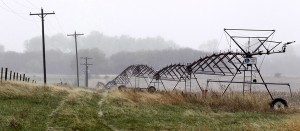There’s no good reason to stall the Keystone pipeline

By Casey Given
The U.S. Senate this week narrowly failed to acquire the 60 votes needed to approve the construction of the Keystone XL pipeline.
The project has been in limbo since its initial proposition in 2008 despite paltry evidence that the 1,179-mile pipeline would cause any environmental damage. Here are four good reasons Congress and the president should approve XL as soon as possible.
-
Most of the Keystone pipeline is already complete.
STALLING: The construction on the Keystone Pipeline has been stalled since 2008 despite the fact that it is in its final leg of a four-phase project.
One fact that has been neglected in the media’ coverage of XL is the fact that it is the final leg of a four-phase project, most of which has already been completed. The pipeline is already flowing, delivering oil from the tar sands of Alberta to refineries and distribution centers in the American heartland and Gulf Coast. XL, on the other hand, is merely an extension of the already existing pipeline that essentially would serve as a shortcut from Alberta to Steele City, Neb., cutting across Montana and the Dakotas instead in a more direct route to refineries than Phase I. If environmentalists and the federal government are concerned about the pipeline, they should have caused more of a ruckus years ago before most of the pipeline was built. Stalling XL is too little, too late.
-
It would create 42,000-plus jobs.
In the U.S.’s lagging economy, it’s particularly shameful that the president and Congress have stalled a project that easily will create thousands of jobs. Although it is impossible to know exactly how many jobs XL will create, the State Department’s final impact report puts the number at 42,100. Granted, most of these jobs are temporary for the pipeline’s construction. Nevertheless, the $3.4 billion of private capital injected into the American economy will have a widespread effect, supporting thousands of jobs as workers spend their money on food, housing, and other necessities of life. In this economy, no number of new jobs is too little to support economic growth.
-
If Americans don’t refine Canadian oil, someone else will.
One common objection to the pipeline is that the oil flowing through it is Canadian, but this concern makes no sense in our global economy. International projects like the Keystone are beneficial to all parties involved. In the case of Keystone, Canadian companies can sell their oil to American markets, while American refiners and distributors get a slice of the profit as well. It’s a win-win. If the oil was left untapped, as many environmentalists would prefer, another company or country would doubtlessly seize on the opportunity to sell the oil.
4. There are little environmental dangers.
Naturally, the loudest objection to XL has been its environmental impact. From the carbon emissions needed to create the pipeline to the potential of an oil spill in the heartland, opponents have used any and every scenario to slow the project’s progress. While it is true that accidents do occasionally happen in the oil industry as with any business, there is nothing exceptionally dangerous about XL. In fact, the State Department itself concluded that XL’s construction would not alter global greenhouse gas emissions in its final impact report. By disapproving of the project, the Senate and president are ignoring the evidence put forward by their own experts. In the name of economic growth, job creation, and sanity, it’s time to finally approve the pipeline.







